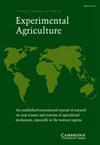桉树生物炭施用对沙质土壤陆稻-甘蔗种植系统温室气体排放的影响
IF 1.9
4区 农林科学
Q1 Agricultural and Biological Sciences
引用次数: 0
摘要
摘要在泰国东北部进行了一项田间试验,以评估不同桉树生物炭(BC)施用率和矿物肥料对旱地水稻和沙质土壤上的后续甘蔗作物的影响。土壤矿物氮和温室气体排放也进行了评估。田间试验由三个处理组成:无生物炭(BC0)、3.1 Mg ha−1的生物炭(BC1)和6.2 Mg ha−2的生物炭。所有处理均采用相同的推荐施肥量。施用BC后,监测土壤矿物N以及二氧化碳(CO2)、甲烷(CH4)和一氧化二氮(N2O)的排放。结果表明,BC2处理的土壤矿质氮含量低于BC0处理。在甘蔗期,BC2处理比BC1处理诱导的土壤矿质氮含量更高,但与BC0处理没有显著差异。在旱稻时期,BC2处理的CH4和N2O累积排放量显著低于BC0处理。总之,我们发现BC2处理在整个实验过程中减轻了CH4和N2O排放带来的全球变暖潜力,导致陆稻-甘蔗种植系统土壤氮有效性略有变化。本文章由计算机程序翻译,如有差异,请以英文原文为准。
Impacts of eucalyptus biochar application on greenhouse gas emission from an upland rice–sugarcane cropping system on sandy soil
Summary An on-farm field experiment was conducted in northeastern Thailand to assess the effects of different eucalyptus biochar (BC) application rates, in combination with mineral fertilizers, on upland rice and a succeeding crop of sugarcane on sandy soil. Soil mineral N and greenhouse gas emissions were also evaluated. The field experiment consisted of three treatments: no biochar (BC0), 3.1 Mg ha−1 of biochar (BC1), and 6.2 Mg ha−1 of biochar (BC2). All treatments received the same recommended fertilizer rate. Soil mineral N, and emissions of carbon dioxide (CO2), methane (CH4), and nitrous oxide (N2O) were monitored after BC application. The results revealed that the BC2 treatment caused lower soil mineral N content than that of the BC0 treatment during the upland rice period. During the sugarcane period, the BC2 treatment induced a greater soil mineral N content than the BC1 treatment but had no significant difference from the BC0 treatment. The BC2 treatment resulted in significantly lower cumulative CH4 and N2O emissions than the BC0 treatment during the upland rice period. In conclusion, we found that the BC2 treatment alleviated the global warming potential from CH4 and N2O emissions throughout the experiment, causing slight changes in soil N availability in the upland rice–sugarcane cropping system.
求助全文
通过发布文献求助,成功后即可免费获取论文全文。
去求助
来源期刊

Experimental Agriculture
农林科学-农艺学
CiteScore
2.50
自引率
6.20%
发文量
29
审稿时长
24 months
期刊介绍:
With a focus on the tropical and sub-tropical regions of the world, Experimental Agriculture publishes the results of original research on field, plantation and herbage crops grown for food or feed, or for industrial purposes, and on farming systems, including livestock and people. It reports experimental work designed to explain how crops respond to the environment in biological and physical terms, and on the social and economic issues that may influence the uptake of the results of research by policy makers and farmers, including the role of institutions and partnerships in delivering impact. The journal also publishes accounts and critical discussions of new quantitative and qualitative methods in agricultural and ecosystems research, and of contemporary issues arising in countries where agricultural production needs to develop rapidly. There is a regular book review section and occasional, often invited, reviews of research.
 求助内容:
求助内容: 应助结果提醒方式:
应助结果提醒方式:


